|
leftnav
|
 |
 |
| |
|
|
BETTINA BRANDL-RISI (Free University, Berlin)
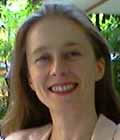 Bettina Brandl-Risi teaches at the Institute for Theatre Studies at the Free University where she is also a postdoctoral research fellow at the Collaborative Research Centre „Kulturen des Performativen“. She received her Dr. phil. in German Literature at the University of Basel, Switzerland. During Spring Term 2008, she has been lecturing at Yale University’s School of Drama. Her articles on performativity and virtuosity, on theatricality and visual mises en scène at the intersections of literature, theatre and the fine arts as well as on image and movement in contemporary performance appeared in several anthologies and journals. Current research interests include participation and audience as well as theories and histories of reading from 1800 to today. Her monograph Die Szene der Narration. Tableaux vivants zwischen Bildender Kunst, Theater und Literatur im 19.
Jahrhundert is forthcoming with Rombach Verlag in 2009. She is the co-editor of the forthcoming book Posen. Zwischen Bild und Bewegung. . Bettina Brandl-Risi teaches at the Institute for Theatre Studies at the Free University where she is also a postdoctoral research fellow at the Collaborative Research Centre „Kulturen des Performativen“. She received her Dr. phil. in German Literature at the University of Basel, Switzerland. During Spring Term 2008, she has been lecturing at Yale University’s School of Drama. Her articles on performativity and virtuosity, on theatricality and visual mises en scène at the intersections of literature, theatre and the fine arts as well as on image and movement in contemporary performance appeared in several anthologies and journals. Current research interests include participation and audience as well as theories and histories of reading from 1800 to today. Her monograph Die Szene der Narration. Tableaux vivants zwischen Bildender Kunst, Theater und Literatur im 19.
Jahrhundert is forthcoming with Rombach Verlag in 2009. She is the co-editor of the forthcoming book Posen. Zwischen Bild und Bewegung. .
|
|
FROM THE FREE UNIVERSITY, BERLIN
Clemens Risi
Bettina Brandl-Risi
Gabrielle Brandstetter
Jan Lazardzig
Helmar Schramm
FROM BROWN UNIVERSITY
Spencer Golub
Dana Gooley
Kiri Miller
Peter Saval
Rebecca Schneider
Roberto Simanowski
Michael Steinberg
Patricia Ybarra
FROM OTHER UNIVERSITIES
Pannill Camp
Branislav Jakovljevic
David Levin |
GABRIELE BRANDSTETTER (Free University, Berlin)
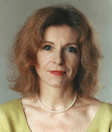 Gabriele Brandstetter is seen as one of the most innovative research figures in German cultural studies. Trained as a philologist and German studies specialist, she is known and internationally recognized as a pioneer in dance studies and was decisively involved in establishing this field as a university discipline. Her interdisciplinary orientation is evident in the 100 and more articles which she has written and which bring together and compare the worlds of theatre, music, art and literature; and it can also be seen in her research projects and in the exhibitions, conferences and dance festivals which she has organized. Gabriele Brandstetter is seen as one of the most innovative research figures in German cultural studies. Trained as a philologist and German studies specialist, she is known and internationally recognized as a pioneer in dance studies and was decisively involved in establishing this field as a university discipline. Her interdisciplinary orientation is evident in the 100 and more articles which she has written and which bring together and compare the worlds of theatre, music, art and literature; and it can also be seen in her research projects and in the exhibitions, conferences and dance festivals which she has organized.
Gabriele Brandstetter read German, history, politics and theatre studies at Erlangen, Regensburg, Vienna and Munich and completed her studies at the University of Munich in 1983 with a thesis on the lyric poetry of Clemens Brentano. She subsequently taught and researched at the University of Bayreuth until 1993. Following her habilitation in the same year, she took a position at the University of Giessen before accepting a professorship at the University of Basel four years later. She then moved from there to the Institute for Theatre Studies at the Free University Berlin, where she is a member of the Collaborative Research Center, „Kulturen des Performativen.“
|
|
PANNILL CAMP (Harvard University)
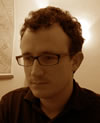 Pannill Camp is a postdoctoral fellow at the Humanities Center at Harvard. He studies dramatic theory, the history of philosophy, and the historiography of modern western theatre, focusing on exchanges between theatrical and philosophical representations in early modern France. His dissertation project, “Le Premier Cadre: Theatre Architecture and Objects of Knowledge in Eighteenth-Century France,” examines the appropriation of spatial representations and geometric forms from optics on the part of theatre architects near the end of the Ancien Régime, and argues that the spectatorial encounter cultivated by late eighteenth-century dramatic theorists and architectural reformers took on attributes of empirical philosophy’s encounter with the natural world. His article, “The Trouble with Phenomenology,” appeared in the Fall 2004 Journal of Dramatic Theory and Criticism, and his essay, entitled “Theatre Optics: Enlightenment Theatre Architecture in France and the Architectonics of Husserl’s Phenomenology” was published in Theatre Journal’s “New Paradigms” special issue in December, 2007. Pannill Camp is a postdoctoral fellow at the Humanities Center at Harvard. He studies dramatic theory, the history of philosophy, and the historiography of modern western theatre, focusing on exchanges between theatrical and philosophical representations in early modern France. His dissertation project, “Le Premier Cadre: Theatre Architecture and Objects of Knowledge in Eighteenth-Century France,” examines the appropriation of spatial representations and geometric forms from optics on the part of theatre architects near the end of the Ancien Régime, and argues that the spectatorial encounter cultivated by late eighteenth-century dramatic theorists and architectural reformers took on attributes of empirical philosophy’s encounter with the natural world. His article, “The Trouble with Phenomenology,” appeared in the Fall 2004 Journal of Dramatic Theory and Criticism, and his essay, entitled “Theatre Optics: Enlightenment Theatre Architecture in France and the Architectonics of Husserl’s Phenomenology” was published in Theatre Journal’s “New Paradigms” special issue in December, 2007.
|
|
SPENCER GOLUB (Brown University)
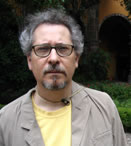 Author of the books Evreinov: The Theatre of Paradox and Transformation (1984), the Callaway award winning The Recurrence of Fate: Theatre and Memory in Twentieth-Century Russia (1994) and Infinity (Stage) (1999), Spencer Golub has also contributed 150 entries to The Cambridge Guide to World Theatre and The Cambridge Guide to American Theatre and published essays in a wide variety of books and professional journals. He also has been a regular reviewer for Choice and an editorial board member of Teatr: Russian Theatre Past and Present, Theatre Survey, New England Theatre Journal and Theatre Insight. He has worked as a professional stage director, journalist, script consultant and associate artistic director in New York City and served as a guest scholar at professional regional theatres. His research interests include Russian Theatre, the performance of mind through the evidence of film and allied to personal narrative and dramatic fictions, adapting surrealist-based methodologies for scholarly and creative writing, and reconceptualizing the idea of "the Baroque." He continues also to stage productions, including most recently The Misanthrope and The Changeling. He is currently working on two novels and serving as Director of Graduate Studies in the Department. Author of the books Evreinov: The Theatre of Paradox and Transformation (1984), the Callaway award winning The Recurrence of Fate: Theatre and Memory in Twentieth-Century Russia (1994) and Infinity (Stage) (1999), Spencer Golub has also contributed 150 entries to The Cambridge Guide to World Theatre and The Cambridge Guide to American Theatre and published essays in a wide variety of books and professional journals. He also has been a regular reviewer for Choice and an editorial board member of Teatr: Russian Theatre Past and Present, Theatre Survey, New England Theatre Journal and Theatre Insight. He has worked as a professional stage director, journalist, script consultant and associate artistic director in New York City and served as a guest scholar at professional regional theatres. His research interests include Russian Theatre, the performance of mind through the evidence of film and allied to personal narrative and dramatic fictions, adapting surrealist-based methodologies for scholarly and creative writing, and reconceptualizing the idea of "the Baroque." He continues also to stage productions, including most recently The Misanthrope and The Changeling. He is currently working on two novels and serving as Director of Graduate Studies in the Department.
|
|
DANA GOOLEY (Brown University)
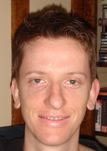 Dana Gooley's research focuses on 19th century European musical culture. His publications have focused on the cult of the virtuoso, music criticism, and the role of charisma in the public sphere of 19th century Europe. He is the author of The Virtuoso Liszt (Cambridge, 2004) and co-editor of Franz Liszt and his World (Princeton, 2006). He is currently researching a book on the pianist-composers of the 19th century and their improvisational practices. He also writes about jazz history, and is presently engaged in a study of jazz-pop crossovers in the 1950s. Dana Gooley's research focuses on 19th century European musical culture. His publications have focused on the cult of the virtuoso, music criticism, and the role of charisma in the public sphere of 19th century Europe. He is the author of The Virtuoso Liszt (Cambridge, 2004) and co-editor of Franz Liszt and his World (Princeton, 2006). He is currently researching a book on the pianist-composers of the 19th century and their improvisational practices. He also writes about jazz history, and is presently engaged in a study of jazz-pop crossovers in the 1950s.
|
|
BRANISLAV JAKOVLJEVIC (Stanford University)
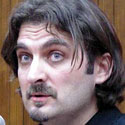 Branislav Jakovljevic joined Stanford University's Department of Drama in the fall of 2006. His areas of scholarly interests include the avant-garde (across disciplines—theater, literature, visual arts, music—and periods—European avant-gardes of the late nineteenth and early twentieth centuries, post-World War II avant-garde in Europe and America), theater history, dramaturgy, performance theory, philosophy of the event, and, most recently, performance and law. He teaches undergraduate and graduate courses in avant-garde, performance theory, and theater history. He has published essays on a broad variety of subjects, from history of late nineteenth-century theater, to Russian and Soviet avant-garde, to contemporary American experimental performance (The Wooster Group, composer John Adams, the site-specific performance group Skewed Visions). His works have been published in the United States (Theatre Journal, TDR, PAJ, Art Journal, Theater) and in Europe (Serbia, United Kingdom, Spain, Sweden, and Belgium). His book Daniil Kharms: Writing and the Event is forthcoming from Northwestern University Press. Jakovljevic received his B.A. in Dramaturgy from the School of Theater, Film, Television, and Radio in Belgrade, Serbia, where he also worked professionally in theater as playwsight and dramaturg and wrote theater criticism. He earned his MA and PhD at the Department of Performance Studies, New York University. Branislav Jakovljevic joined Stanford University's Department of Drama in the fall of 2006. His areas of scholarly interests include the avant-garde (across disciplines—theater, literature, visual arts, music—and periods—European avant-gardes of the late nineteenth and early twentieth centuries, post-World War II avant-garde in Europe and America), theater history, dramaturgy, performance theory, philosophy of the event, and, most recently, performance and law. He teaches undergraduate and graduate courses in avant-garde, performance theory, and theater history. He has published essays on a broad variety of subjects, from history of late nineteenth-century theater, to Russian and Soviet avant-garde, to contemporary American experimental performance (The Wooster Group, composer John Adams, the site-specific performance group Skewed Visions). His works have been published in the United States (Theatre Journal, TDR, PAJ, Art Journal, Theater) and in Europe (Serbia, United Kingdom, Spain, Sweden, and Belgium). His book Daniil Kharms: Writing and the Event is forthcoming from Northwestern University Press. Jakovljevic received his B.A. in Dramaturgy from the School of Theater, Film, Television, and Radio in Belgrade, Serbia, where he also worked professionally in theater as playwsight and dramaturg and wrote theater criticism. He earned his MA and PhD at the Department of Performance Studies, New York University.
|
|
JAN LAZARDZIG (Free University, Berlin)
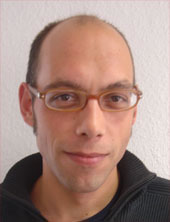 Jan Lazarzig teaches at the Theater Studies at the Free University, and is also a member of Collaborative Research Centre „Kulturen des Performativen.“ His dissertation has been published as Theatermaschine und Festungsbau. Paradoxien der Wissensproduktion im 17. Jahrhundert (Berlin: Akademie Verlag, 2007). He is currently working on the intersection of theatre and science in the pre-modern era. He is writing a Habilitation on the history of theatre censorship, and teaches at the FU on on topics such as baroque theatre, theatre architecture, historiography of theatre, theatre censorship and anti-theatrical movements. Jan Lazarzig teaches at the Theater Studies at the Free University, and is also a member of Collaborative Research Centre „Kulturen des Performativen.“ His dissertation has been published as Theatermaschine und Festungsbau. Paradoxien der Wissensproduktion im 17. Jahrhundert (Berlin: Akademie Verlag, 2007). He is currently working on the intersection of theatre and science in the pre-modern era. He is writing a Habilitation on the history of theatre censorship, and teaches at the FU on on topics such as baroque theatre, theatre architecture, historiography of theatre, theatre censorship and anti-theatrical movements.
|
|
DAVID LEVIN (University of Chicago)
 David J. Levin is Associate Professor in the Department of Germanic Studies, the Committee on Cinema & Media Studies, and the Committee on Theater and Performance Studies; he is also currently serving as Co-Director of the Master of Arts Program in the Humanities (MAPH). Before joining the faculty at Chicago in 1998, he taught German and Theater Studies at Columbia University. Professor Levin’s recent work focuses on the aesthetics and politics of performance in opera, drama, and cinema. In 1994, he edited Opera Opera Through Other Eyes (Stanford University Press); his Richard Wagner, Fritz Lang, and the Nibelungen: The Dramaturgy of Disavowal was published by Princeton University Press in 1998. His latest book Unsettling Opera: Staging Mozart, Verdi, Wagner, and Zemlinsky was published by the University of Chicago Press in 2007. Professor Levin has also worked extensively as a dramaturg for various opera houses in Germany and the United States and for William Forsythe's Frankfurt Ballet. He serves as executive editor of the Opera Quarterly, published by Oxford University Press. During the summer of 2008, Prof. Levin once again joined Juliane Vogel and Christopher Wild to team-teach a “Kompakt Seminar” at the University of Konstanz: this summer’s theme will be “Auftreten und Erzählen”. In addition, he team-taught a Kompakt Seminar at the University of Mainz with Clemens Risi (F.U. Berlin) on "Wagner, Performance, and the Body" as part of the International Postgraduate Program in Performance & Media Studies. David J. Levin is Associate Professor in the Department of Germanic Studies, the Committee on Cinema & Media Studies, and the Committee on Theater and Performance Studies; he is also currently serving as Co-Director of the Master of Arts Program in the Humanities (MAPH). Before joining the faculty at Chicago in 1998, he taught German and Theater Studies at Columbia University. Professor Levin’s recent work focuses on the aesthetics and politics of performance in opera, drama, and cinema. In 1994, he edited Opera Opera Through Other Eyes (Stanford University Press); his Richard Wagner, Fritz Lang, and the Nibelungen: The Dramaturgy of Disavowal was published by Princeton University Press in 1998. His latest book Unsettling Opera: Staging Mozart, Verdi, Wagner, and Zemlinsky was published by the University of Chicago Press in 2007. Professor Levin has also worked extensively as a dramaturg for various opera houses in Germany and the United States and for William Forsythe's Frankfurt Ballet. He serves as executive editor of the Opera Quarterly, published by Oxford University Press. During the summer of 2008, Prof. Levin once again joined Juliane Vogel and Christopher Wild to team-teach a “Kompakt Seminar” at the University of Konstanz: this summer’s theme will be “Auftreten und Erzählen”. In addition, he team-taught a Kompakt Seminar at the University of Mainz with Clemens Risi (F.U. Berlin) on "Wagner, Performance, and the Body" as part of the International Postgraduate Program in Performance & Media Studies.
|
|
KIRI MILLER (Brown University)
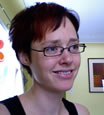 Kiri Miller is an ethnomusicologist at Brown University's Department of Music whose work focuses on music of the Americas and ethnographic approaches to new technological practices. Her current research topics are videogame music and Sacred Harp/shape-note singing. She holds the Ph.D. in music from Harvard University and completed a Killam Memorial Postdoctoral Fellowship at the University of Alberta. Courses she has taught or will soon be teaching include Latino Diaspora Music, Musical Youth Cultures, Diaspora Music in the Americas, Music and Technoculture, and upper-level courses on ethnographic theory and method in ethnomusicology. Kiri Miller is an ethnomusicologist at Brown University's Department of Music whose work focuses on music of the Americas and ethnographic approaches to new technological practices. Her current research topics are videogame music and Sacred Harp/shape-note singing. She holds the Ph.D. in music from Harvard University and completed a Killam Memorial Postdoctoral Fellowship at the University of Alberta. Courses she has taught or will soon be teaching include Latino Diaspora Music, Musical Youth Cultures, Diaspora Music in the Americas, Music and Technoculture, and upper-level courses on ethnographic theory and method in ethnomusicology.
|
|
CLEMENS RISI (Free University, Berlin)
Clemens Risi is Assistant Professor for opera and music theatre at the Freie Universität Berlin, and member of the Collaborative Research Center "Kulturen des Performativen". In spring 2008, he was Max Kade Visiting Professor for German Studies and Music at Brown University. He studied musicology, theatre studies, and business administration in Mainz, Munich and Rome. In 2001, he received his Dr. phil. in musicology at the Universität Mainz.
He has published several articles about opera and music theatre from the 17th century to the present time, the performative dimension and the voices in opera, theatre performance analysis, and theories of rhythm and perception. He has published a monograph "Auf dem Weg zu einem italienischen Musikdrama" (2004), is currently finishing a book on "Opera in Performance" and preparing a monograph for the 2005 Parma Verdi Prize about performance practice in mid-19th century Italian opera.
|
|
PETER SAVAL (Brown University)
 Peter Kishore Saval studies the classical tradition in Renaissance literature, with particular emphasis on Renaissance Platonism. He is also interested generally in the relationship between early modern literature and philosophy. He received his doctorate in English literature from Harvard University in 2008, and a J.D. from University of California, Berkeley School of Law in 1999. At Harvard he taught both in the English Department and in the Literature Concentration of the Department of Comparative Literature. Saval teaches courses on early modern literature, including European Early Modern Drama, and Renaissance Epic. He is also teaching a seminar on genius and melancholia in the Renaissance. Peter Kishore Saval studies the classical tradition in Renaissance literature, with particular emphasis on Renaissance Platonism. He is also interested generally in the relationship between early modern literature and philosophy. He received his doctorate in English literature from Harvard University in 2008, and a J.D. from University of California, Berkeley School of Law in 1999. At Harvard he taught both in the English Department and in the Literature Concentration of the Department of Comparative Literature. Saval teaches courses on early modern literature, including European Early Modern Drama, and Renaissance Epic. He is also teaching a seminar on genius and melancholia in the Renaissance.
|
|
REBECCA SCHNEIDER (Brown University)
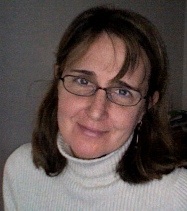 Rebecca Schneider is Chair of the Department of Theatre, Speech, and Dance. She has written extensively on theatre and performance
practices that stretch accepted borders around media. She has also written
on performance art, photography, architecture, and everyday life as
"performative." She teaches in theatre history as well as on performance art, gender- and race-critical performance, and visual culture and performance. She is the author of The Explicit Body in Performance (Routledge, 1997) and is working on a second book titled Reenactment: Essays on Performance Remains in Visual Culture. She has coedited the anthology Re:Direction: A Theoretical and Practical Guide to 20th-Century Directing. She is a contributing editor to TDR: The Drama Review and coeditor with David Krasner of the book series "Theatre: Theory/Text/Performance" with University of Michigan Press. Schneider has published essays in several anthologies, including Psychoanalysis and Performance, Acting Out: Feminist Performance, Performance and Cultural Politics, and the essay "Solo Solo Solo" in After Criticism. As a "performing theorist," she has collaborated with artists at such sites as the British Museum in London and the Mobile Academy in Berlin. Rebecca Schneider is Chair of the Department of Theatre, Speech, and Dance. She has written extensively on theatre and performance
practices that stretch accepted borders around media. She has also written
on performance art, photography, architecture, and everyday life as
"performative." She teaches in theatre history as well as on performance art, gender- and race-critical performance, and visual culture and performance. She is the author of The Explicit Body in Performance (Routledge, 1997) and is working on a second book titled Reenactment: Essays on Performance Remains in Visual Culture. She has coedited the anthology Re:Direction: A Theoretical and Practical Guide to 20th-Century Directing. She is a contributing editor to TDR: The Drama Review and coeditor with David Krasner of the book series "Theatre: Theory/Text/Performance" with University of Michigan Press. Schneider has published essays in several anthologies, including Psychoanalysis and Performance, Acting Out: Feminist Performance, Performance and Cultural Politics, and the essay "Solo Solo Solo" in After Criticism. As a "performing theorist," she has collaborated with artists at such sites as the British Museum in London and the Mobile Academy in Berlin.
|
|
HELMAR SCHRAMM (Free University, Berlin)
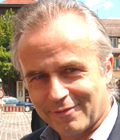 Helmar Schramm is Professor of Theater and Drama at the Free University of Berlin and a member of the Collaborative Research Center, „Kulturen des Performativen.“ He received his Ph.D. from Berlin's Humboldt University in 1979. Professor Schramm has previously taught at the University of Leipzig's Theater Department and held research positions at Humboldt University, the Academy of Applied Sciences (Berlin), and the Max Planck of Berlin. His research areas include theater and culture in the field of media and science history, aesthetic theories of theater, and experiments and games. He is currently researching experimental thinking in the 17th century and its connection to the Avant-garde. His publications include A Carnival of Thought: Theatricality as Reflected in Philosophical Texts of the 16th and 17th centuries (unofficial translation) (1996), Fragments in the History of Poetry and Imagination (unofficial translation) (1996) in collaboration with Bernhard J. Dotzler, among several others. Helmar Schramm is Professor of Theater and Drama at the Free University of Berlin and a member of the Collaborative Research Center, „Kulturen des Performativen.“ He received his Ph.D. from Berlin's Humboldt University in 1979. Professor Schramm has previously taught at the University of Leipzig's Theater Department and held research positions at Humboldt University, the Academy of Applied Sciences (Berlin), and the Max Planck of Berlin. His research areas include theater and culture in the field of media and science history, aesthetic theories of theater, and experiments and games. He is currently researching experimental thinking in the 17th century and its connection to the Avant-garde. His publications include A Carnival of Thought: Theatricality as Reflected in Philosophical Texts of the 16th and 17th centuries (unofficial translation) (1996), Fragments in the History of Poetry and Imagination (unofficial translation) (1996) in collaboration with Bernhard J. Dotzler, among several others.
|
|
ROBERTO SIMANOWSKI (Brown University)
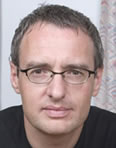 Roberto Simanowski has written three books on digital culture and aesthetics: Digitale Medien in der Erlebnisgesellschaft. Kultur – Kunst – Utopie, published with Rowohlt in fall 2008 explores the cultural, social and political ramifications of digital media; Reading Digital Arts. In-Depth-Analysis and Historic Contextualization (forthcoming with University of Minnesota Press in 2009) and Ereignis und Bedeutung in digitaler Kunst. Prozessualität – Transformation – Spektakel (forthcoming with Transcript in 2009) explore the specific aesthetics of digital literature and arts. Together with two colleagues from Germany Simanowski is currently editing a book about methods of researching and teaching digital literature in different academic environment in various countries (Reading Moving Letters: Digital Literature in Research and Teaching. A Handbook forthcoming with Transcript in 2009). Simanowski's next book project about cultural identity combines an investigation of the idea of nationalism and cosmopolitanism in Germany around 1800 (focusing on Herder, Jean Paul and Fichte) with the debate on identity and multiculturalism in Germany after reunification and in the age of globalization in the late 20th and early 21st century. Roberto Simanowski has written three books on digital culture and aesthetics: Digitale Medien in der Erlebnisgesellschaft. Kultur – Kunst – Utopie, published with Rowohlt in fall 2008 explores the cultural, social and political ramifications of digital media; Reading Digital Arts. In-Depth-Analysis and Historic Contextualization (forthcoming with University of Minnesota Press in 2009) and Ereignis und Bedeutung in digitaler Kunst. Prozessualität – Transformation – Spektakel (forthcoming with Transcript in 2009) explore the specific aesthetics of digital literature and arts. Together with two colleagues from Germany Simanowski is currently editing a book about methods of researching and teaching digital literature in different academic environment in various countries (Reading Moving Letters: Digital Literature in Research and Teaching. A Handbook forthcoming with Transcript in 2009). Simanowski's next book project about cultural identity combines an investigation of the idea of nationalism and cosmopolitanism in Germany around 1800 (focusing on Herder, Jean Paul and Fichte) with the debate on identity and multiculturalism in Germany after reunification and in the age of globalization in the late 20th and early 21st century.
|
|
MICHAEL STEINBERG (Brown University)
 Michael P. Steinberg is Director of the Cogut Center for the Humanities and Professor of History and Music at Brown University. He also serves as Associate Editor of The Musical Quarterly and The Opera Quarterly. He was a member of the Cornell University Department of History between 1988 and 2005. Educated at Princeton University and the University of Chicago, he has been a visiting professor at these two schools as well as at the Ecole des Hautes Etudes en Sciences Sociales in Paris and National Tsing-hua University in Taiwan. His main research interests include the cultural history of modern Germany and Austria with particular attention to German Jewish intellectual history and the cultural history of music. He has written and lectured widely on these topics for the New York Times and at the Lincoln Center for the Performing Arts, the Bard Music Festival, and the Salzburg Festival. He has received fellowships from the American Council of Learned Societies, the National Endowment for the Humanities, the John Simon Guggenheim Memorial Foundation as well as the Berlin Prize from the American Academy, Berlin. He is the author of Austria as Theater and Ideology: The Meaning of the Salzburg Festival (Cornell University Press, 2000), of which the German edition (Ursprung und Ideologie der Salzburger Festspiele; Anton Pustet Verlag, 2000) won Austria's Victor Adler Staatspreis in 2001. A book called Listening to Reason: Culture, Subjectivity, and 19th- Century Music appeared with Princeton University Press in early 2004; Judaism Musical and Unmusical is forthcoming from the University of Chicago Press. Michael P. Steinberg is Director of the Cogut Center for the Humanities and Professor of History and Music at Brown University. He also serves as Associate Editor of The Musical Quarterly and The Opera Quarterly. He was a member of the Cornell University Department of History between 1988 and 2005. Educated at Princeton University and the University of Chicago, he has been a visiting professor at these two schools as well as at the Ecole des Hautes Etudes en Sciences Sociales in Paris and National Tsing-hua University in Taiwan. His main research interests include the cultural history of modern Germany and Austria with particular attention to German Jewish intellectual history and the cultural history of music. He has written and lectured widely on these topics for the New York Times and at the Lincoln Center for the Performing Arts, the Bard Music Festival, and the Salzburg Festival. He has received fellowships from the American Council of Learned Societies, the National Endowment for the Humanities, the John Simon Guggenheim Memorial Foundation as well as the Berlin Prize from the American Academy, Berlin. He is the author of Austria as Theater and Ideology: The Meaning of the Salzburg Festival (Cornell University Press, 2000), of which the German edition (Ursprung und Ideologie der Salzburger Festspiele; Anton Pustet Verlag, 2000) won Austria's Victor Adler Staatspreis in 2001. A book called Listening to Reason: Culture, Subjectivity, and 19th- Century Music appeared with Princeton University Press in early 2004; Judaism Musical and Unmusical is forthcoming from the University of Chicago Press.
|
|
PATRICIA YBARRA (Brown University)
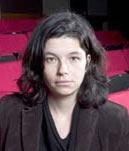 Patricia Ybarra received her B.A. from Columbia University in 1994 and her Ph.D. from the University of Minnesota-Twin Cities in Theatre History and Criticism in 2002. She is the Focus Group representative for the Latino/a Focus group of the Association for Theatre in Higher Education. Her first manuscript Performing Conquest: Theatre, History and Identity in Tlaxcala, Mexico is under contract with University of Michigan Press. Recent and forthcoming publications include articles and reviews in Theatre Journal, TDR, Aztlan, and the Journal of Dramatic Theory and Criticism. Her area of specialization is theatre historiography of the Americas, with emphasis on the relationship between theatre, nationalism, and American identities in North America. She is also a director, dramaturg and the former administrator of Richard Foreman's Ontological-Hysteric Theatre. Patricia Ybarra received her B.A. from Columbia University in 1994 and her Ph.D. from the University of Minnesota-Twin Cities in Theatre History and Criticism in 2002. She is the Focus Group representative for the Latino/a Focus group of the Association for Theatre in Higher Education. Her first manuscript Performing Conquest: Theatre, History and Identity in Tlaxcala, Mexico is under contract with University of Michigan Press. Recent and forthcoming publications include articles and reviews in Theatre Journal, TDR, Aztlan, and the Journal of Dramatic Theory and Criticism. Her area of specialization is theatre historiography of the Americas, with emphasis on the relationship between theatre, nationalism, and American identities in North America. She is also a director, dramaturg and the former administrator of Richard Foreman's Ontological-Hysteric Theatre.
|
|
|
 |

|
|
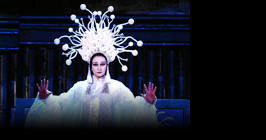
 Bettina Brandl-Risi teaches at the Institute for Theatre Studies at the Free University where she is also a postdoctoral research fellow at the Collaborative Research Centre „
Bettina Brandl-Risi teaches at the Institute for Theatre Studies at the Free University where she is also a postdoctoral research fellow at the Collaborative Research Centre „ Gabriele Brandstetter is seen as one of the most innovative research figures in German cultural studies. Trained as a philologist and German studies specialist, she is known and internationally recognized as a pioneer in dance studies and was decisively involved in establishing this field as a university discipline. Her interdisciplinary orientation is evident in the 100 and more articles which she has written and which bring together and compare the worlds of theatre, music, art and literature; and it can also be seen in her research projects and in the exhibitions, conferences and dance festivals which she has organized.
Gabriele Brandstetter is seen as one of the most innovative research figures in German cultural studies. Trained as a philologist and German studies specialist, she is known and internationally recognized as a pioneer in dance studies and was decisively involved in establishing this field as a university discipline. Her interdisciplinary orientation is evident in the 100 and more articles which she has written and which bring together and compare the worlds of theatre, music, art and literature; and it can also be seen in her research projects and in the exhibitions, conferences and dance festivals which she has organized.  Author of the books Evreinov: The Theatre of Paradox and Transformation (1984), the Callaway award winning The Recurrence of Fate: Theatre and Memory in Twentieth-Century Russia (1994) and Infinity (Stage) (1999), Spencer Golub has also contributed 150 entries to The Cambridge Guide to World Theatre and The Cambridge Guide to American Theatre and published essays in a wide variety of books and professional journals. He also has been a regular reviewer for Choice and an editorial board member of Teatr: Russian Theatre Past and Present, Theatre Survey, New England Theatre Journal and Theatre Insight. He has worked as a professional stage director, journalist, script consultant and associate artistic director in New York City and served as a guest scholar at professional regional theatres. His research interests include Russian Theatre, the performance of mind through the evidence of film and allied to personal narrative and dramatic fictions, adapting surrealist-based methodologies for scholarly and creative writing, and reconceptualizing the idea of "the Baroque." He continues also to stage productions, including most recently The Misanthrope and The Changeling. He is currently working on two novels and serving as Director of Graduate Studies in the Department.
Author of the books Evreinov: The Theatre of Paradox and Transformation (1984), the Callaway award winning The Recurrence of Fate: Theatre and Memory in Twentieth-Century Russia (1994) and Infinity (Stage) (1999), Spencer Golub has also contributed 150 entries to The Cambridge Guide to World Theatre and The Cambridge Guide to American Theatre and published essays in a wide variety of books and professional journals. He also has been a regular reviewer for Choice and an editorial board member of Teatr: Russian Theatre Past and Present, Theatre Survey, New England Theatre Journal and Theatre Insight. He has worked as a professional stage director, journalist, script consultant and associate artistic director in New York City and served as a guest scholar at professional regional theatres. His research interests include Russian Theatre, the performance of mind through the evidence of film and allied to personal narrative and dramatic fictions, adapting surrealist-based methodologies for scholarly and creative writing, and reconceptualizing the idea of "the Baroque." He continues also to stage productions, including most recently The Misanthrope and The Changeling. He is currently working on two novels and serving as Director of Graduate Studies in the Department. Dana Gooley's research focuses on 19th century European musical culture. His publications have focused on the cult of the virtuoso, music criticism, and the role of charisma in the public sphere of 19th century Europe. He is the author of The Virtuoso Liszt (Cambridge, 2004) and co-editor of Franz Liszt and his World (Princeton, 2006). He is currently researching a book on the pianist-composers of the 19th century and their improvisational practices. He also writes about jazz history, and is presently engaged in a study of jazz-pop crossovers in the 1950s.
Dana Gooley's research focuses on 19th century European musical culture. His publications have focused on the cult of the virtuoso, music criticism, and the role of charisma in the public sphere of 19th century Europe. He is the author of The Virtuoso Liszt (Cambridge, 2004) and co-editor of Franz Liszt and his World (Princeton, 2006). He is currently researching a book on the pianist-composers of the 19th century and their improvisational practices. He also writes about jazz history, and is presently engaged in a study of jazz-pop crossovers in the 1950s.  Branislav Jakovljevic joined Stanford University's Department of Drama in the fall of 2006. His areas of scholarly interests include the avant-garde (across disciplines—theater, literature, visual arts, music—and periods—European avant-gardes of the late nineteenth and early twentieth centuries, post-World War II avant-garde in Europe and America), theater history, dramaturgy, performance theory, philosophy of the event, and, most recently, performance and law. He teaches undergraduate and graduate courses in avant-garde, performance theory, and theater history. He has published essays on a broad variety of subjects, from history of late nineteenth-century theater, to Russian and Soviet avant-garde, to contemporary American experimental performance (The Wooster Group, composer John Adams, the site-specific performance group Skewed Visions). His works have been published in the United States (Theatre Journal, TDR, PAJ, Art Journal, Theater) and in Europe (Serbia, United Kingdom, Spain, Sweden, and Belgium). His book Daniil Kharms: Writing and the Event is forthcoming from Northwestern University Press. Jakovljevic received his B.A. in Dramaturgy from the School of Theater, Film, Television, and Radio in Belgrade, Serbia, where he also worked professionally in theater as playwsight and dramaturg and wrote theater criticism. He earned his MA and PhD at the Department of Performance Studies, New York University.
Branislav Jakovljevic joined Stanford University's Department of Drama in the fall of 2006. His areas of scholarly interests include the avant-garde (across disciplines—theater, literature, visual arts, music—and periods—European avant-gardes of the late nineteenth and early twentieth centuries, post-World War II avant-garde in Europe and America), theater history, dramaturgy, performance theory, philosophy of the event, and, most recently, performance and law. He teaches undergraduate and graduate courses in avant-garde, performance theory, and theater history. He has published essays on a broad variety of subjects, from history of late nineteenth-century theater, to Russian and Soviet avant-garde, to contemporary American experimental performance (The Wooster Group, composer John Adams, the site-specific performance group Skewed Visions). His works have been published in the United States (Theatre Journal, TDR, PAJ, Art Journal, Theater) and in Europe (Serbia, United Kingdom, Spain, Sweden, and Belgium). His book Daniil Kharms: Writing and the Event is forthcoming from Northwestern University Press. Jakovljevic received his B.A. in Dramaturgy from the School of Theater, Film, Television, and Radio in Belgrade, Serbia, where he also worked professionally in theater as playwsight and dramaturg and wrote theater criticism. He earned his MA and PhD at the Department of Performance Studies, New York University. Jan Lazarzig teaches at the Theater Studies at the Free University, and is also a member of Collaborative Research Centre
Jan Lazarzig teaches at the Theater Studies at the Free University, and is also a member of Collaborative Research Centre  David J. Levin is Associate Professor in the Department of Germanic Studies, the Committee on Cinema & Media Studies, and the Committee on Theater and Performance Studies; he is also currently serving as Co-Director of the Master of Arts Program in the Humanities (MAPH). Before joining the faculty at Chicago in 1998, he taught German and Theater Studies at Columbia University. Professor Levin’s recent work focuses on the aesthetics and politics of performance in opera, drama, and cinema. In 1994, he edited Opera Opera Through Other Eyes (Stanford University Press); his Richard Wagner, Fritz Lang, and the Nibelungen: The Dramaturgy of Disavowal was published by Princeton University Press in 1998. His latest book Unsettling Opera: Staging Mozart, Verdi, Wagner, and Zemlinsky was published by the University of Chicago Press in 2007. Professor Levin has also worked extensively as a dramaturg for various opera houses in Germany and the United States and for William Forsythe's Frankfurt Ballet. He serves as executive editor of the Opera Quarterly, published by Oxford University Press. During the summer of 2008, Prof. Levin once again joined Juliane Vogel and Christopher Wild to team-teach a “Kompakt Seminar” at the University of Konstanz: this summer’s theme will be “Auftreten und Erzählen”. In addition, he team-taught a Kompakt Seminar at the University of Mainz with Clemens Risi (F.U. Berlin) on "Wagner, Performance, and the Body" as part of the International Postgraduate Program in Performance & Media Studies.
David J. Levin is Associate Professor in the Department of Germanic Studies, the Committee on Cinema & Media Studies, and the Committee on Theater and Performance Studies; he is also currently serving as Co-Director of the Master of Arts Program in the Humanities (MAPH). Before joining the faculty at Chicago in 1998, he taught German and Theater Studies at Columbia University. Professor Levin’s recent work focuses on the aesthetics and politics of performance in opera, drama, and cinema. In 1994, he edited Opera Opera Through Other Eyes (Stanford University Press); his Richard Wagner, Fritz Lang, and the Nibelungen: The Dramaturgy of Disavowal was published by Princeton University Press in 1998. His latest book Unsettling Opera: Staging Mozart, Verdi, Wagner, and Zemlinsky was published by the University of Chicago Press in 2007. Professor Levin has also worked extensively as a dramaturg for various opera houses in Germany and the United States and for William Forsythe's Frankfurt Ballet. He serves as executive editor of the Opera Quarterly, published by Oxford University Press. During the summer of 2008, Prof. Levin once again joined Juliane Vogel and Christopher Wild to team-teach a “Kompakt Seminar” at the University of Konstanz: this summer’s theme will be “Auftreten und Erzählen”. In addition, he team-taught a Kompakt Seminar at the University of Mainz with Clemens Risi (F.U. Berlin) on "Wagner, Performance, and the Body" as part of the International Postgraduate Program in Performance & Media Studies.  Kiri Miller is an ethnomusicologist at Brown University's Department of Music whose work focuses on music of the Americas and ethnographic approaches to new technological practices. Her current research topics are videogame music and Sacred Harp/shape-note singing. She holds the Ph.D. in music from Harvard University and completed a Killam Memorial Postdoctoral Fellowship at the University of Alberta. Courses she has taught or will soon be teaching include Latino Diaspora Music, Musical Youth Cultures, Diaspora Music in the Americas, Music and Technoculture, and upper-level courses on ethnographic theory and method in ethnomusicology.
Kiri Miller is an ethnomusicologist at Brown University's Department of Music whose work focuses on music of the Americas and ethnographic approaches to new technological practices. Her current research topics are videogame music and Sacred Harp/shape-note singing. She holds the Ph.D. in music from Harvard University and completed a Killam Memorial Postdoctoral Fellowship at the University of Alberta. Courses she has taught or will soon be teaching include Latino Diaspora Music, Musical Youth Cultures, Diaspora Music in the Americas, Music and Technoculture, and upper-level courses on ethnographic theory and method in ethnomusicology.
 Peter Kishore Saval studies the classical tradition in Renaissance literature, with particular emphasis on Renaissance Platonism. He is also interested generally in the relationship between early modern literature and philosophy. He received his doctorate in English literature from Harvard University in 2008, and a J.D. from University of California, Berkeley School of Law in 1999. At Harvard he taught both in the English Department and in the Literature Concentration of the Department of Comparative Literature. Saval teaches courses on early modern literature, including European Early Modern Drama, and Renaissance Epic. He is also teaching a seminar on genius and melancholia in the Renaissance.
Peter Kishore Saval studies the classical tradition in Renaissance literature, with particular emphasis on Renaissance Platonism. He is also interested generally in the relationship between early modern literature and philosophy. He received his doctorate in English literature from Harvard University in 2008, and a J.D. from University of California, Berkeley School of Law in 1999. At Harvard he taught both in the English Department and in the Literature Concentration of the Department of Comparative Literature. Saval teaches courses on early modern literature, including European Early Modern Drama, and Renaissance Epic. He is also teaching a seminar on genius and melancholia in the Renaissance. Rebecca Schneider is Chair of the Department of Theatre, Speech, and Dance. She has written extensively on theatre and performance
practices that stretch accepted borders around media. She has also written
on performance art, photography, architecture, and everyday life as
"performative." She teaches in theatre history as well as on performance art, gender- and race-critical performance, and visual culture and performance. She is the author of The Explicit Body in Performance (Routledge, 1997) and is working on a second book titled Reenactment: Essays on Performance Remains in Visual Culture. She has coedited the anthology Re:Direction: A Theoretical and Practical Guide to 20th-Century Directing. She is a contributing editor to TDR: The Drama Review and coeditor with David Krasner of the book series "Theatre: Theory/Text/Performance" with University of Michigan Press. Schneider has published essays in several anthologies, including Psychoanalysis and Performance, Acting Out: Feminist Performance, Performance and Cultural Politics, and the essay "Solo Solo Solo" in After Criticism. As a "performing theorist," she has collaborated with artists at such sites as the British Museum in London and the Mobile Academy in Berlin.
Rebecca Schneider is Chair of the Department of Theatre, Speech, and Dance. She has written extensively on theatre and performance
practices that stretch accepted borders around media. She has also written
on performance art, photography, architecture, and everyday life as
"performative." She teaches in theatre history as well as on performance art, gender- and race-critical performance, and visual culture and performance. She is the author of The Explicit Body in Performance (Routledge, 1997) and is working on a second book titled Reenactment: Essays on Performance Remains in Visual Culture. She has coedited the anthology Re:Direction: A Theoretical and Practical Guide to 20th-Century Directing. She is a contributing editor to TDR: The Drama Review and coeditor with David Krasner of the book series "Theatre: Theory/Text/Performance" with University of Michigan Press. Schneider has published essays in several anthologies, including Psychoanalysis and Performance, Acting Out: Feminist Performance, Performance and Cultural Politics, and the essay "Solo Solo Solo" in After Criticism. As a "performing theorist," she has collaborated with artists at such sites as the British Museum in London and the Mobile Academy in Berlin.  Helmar Schramm is Professor of Theater and Drama at the Free University of Berlin and a member of the Collaborative Research Center,
Helmar Schramm is Professor of Theater and Drama at the Free University of Berlin and a member of the Collaborative Research Center,  Roberto Simanowski has written three books on digital culture and aesthetics: Digitale Medien in der Erlebnisgesellschaft. Kultur – Kunst – Utopie, published with Rowohlt in fall 2008 explores the cultural, social and political ramifications of digital media; Reading Digital Arts. In-Depth-Analysis and Historic Contextualization (forthcoming with University of Minnesota Press in 2009) and Ereignis und Bedeutung in digitaler Kunst. Prozessualität – Transformation – Spektakel (forthcoming with Transcript in 2009) explore the specific aesthetics of digital literature and arts. Together with two colleagues from Germany Simanowski is currently editing a book about methods of researching and teaching digital literature in different academic environment in various countries (Reading Moving Letters: Digital Literature in Research and Teaching. A Handbook forthcoming with Transcript in 2009). Simanowski's next book project about cultural identity combines an investigation of the idea of nationalism and cosmopolitanism in Germany around 1800 (focusing on Herder, Jean Paul and Fichte) with the debate on identity and multiculturalism in Germany after reunification and in the age of globalization in the late 20th and early 21st century.
Roberto Simanowski has written three books on digital culture and aesthetics: Digitale Medien in der Erlebnisgesellschaft. Kultur – Kunst – Utopie, published with Rowohlt in fall 2008 explores the cultural, social and political ramifications of digital media; Reading Digital Arts. In-Depth-Analysis and Historic Contextualization (forthcoming with University of Minnesota Press in 2009) and Ereignis und Bedeutung in digitaler Kunst. Prozessualität – Transformation – Spektakel (forthcoming with Transcript in 2009) explore the specific aesthetics of digital literature and arts. Together with two colleagues from Germany Simanowski is currently editing a book about methods of researching and teaching digital literature in different academic environment in various countries (Reading Moving Letters: Digital Literature in Research and Teaching. A Handbook forthcoming with Transcript in 2009). Simanowski's next book project about cultural identity combines an investigation of the idea of nationalism and cosmopolitanism in Germany around 1800 (focusing on Herder, Jean Paul and Fichte) with the debate on identity and multiculturalism in Germany after reunification and in the age of globalization in the late 20th and early 21st century.  Michael P. Steinberg is Director of the Cogut Center for the Humanities and Professor of History and Music at Brown University. He also serves as Associate Editor of The Musical Quarterly and The Opera Quarterly. He was a member of the Cornell University Department of History between 1988 and 2005. Educated at Princeton University and the University of Chicago, he has been a visiting professor at these two schools as well as at the Ecole des Hautes Etudes en Sciences Sociales in Paris and National Tsing-hua University in Taiwan. His main research interests include the cultural history of modern Germany and Austria with particular attention to German Jewish intellectual history and the cultural history of music. He has written and lectured widely on these topics for the New York Times and at the Lincoln Center for the Performing Arts, the Bard Music Festival, and the Salzburg Festival. He has received fellowships from the American Council of Learned Societies, the National Endowment for the Humanities, the John Simon Guggenheim Memorial Foundation as well as the Berlin Prize from the American Academy, Berlin. He is the author of Austria as Theater and Ideology: The Meaning of the Salzburg Festival (Cornell University Press, 2000), of which the German edition (Ursprung und Ideologie der Salzburger Festspiele; Anton Pustet Verlag, 2000) won Austria's Victor Adler Staatspreis in 2001. A book called Listening to Reason: Culture, Subjectivity, and 19th- Century Music appeared with Princeton University Press in early 2004; Judaism Musical and Unmusical is forthcoming from the University of Chicago Press.
Michael P. Steinberg is Director of the Cogut Center for the Humanities and Professor of History and Music at Brown University. He also serves as Associate Editor of The Musical Quarterly and The Opera Quarterly. He was a member of the Cornell University Department of History between 1988 and 2005. Educated at Princeton University and the University of Chicago, he has been a visiting professor at these two schools as well as at the Ecole des Hautes Etudes en Sciences Sociales in Paris and National Tsing-hua University in Taiwan. His main research interests include the cultural history of modern Germany and Austria with particular attention to German Jewish intellectual history and the cultural history of music. He has written and lectured widely on these topics for the New York Times and at the Lincoln Center for the Performing Arts, the Bard Music Festival, and the Salzburg Festival. He has received fellowships from the American Council of Learned Societies, the National Endowment for the Humanities, the John Simon Guggenheim Memorial Foundation as well as the Berlin Prize from the American Academy, Berlin. He is the author of Austria as Theater and Ideology: The Meaning of the Salzburg Festival (Cornell University Press, 2000), of which the German edition (Ursprung und Ideologie der Salzburger Festspiele; Anton Pustet Verlag, 2000) won Austria's Victor Adler Staatspreis in 2001. A book called Listening to Reason: Culture, Subjectivity, and 19th- Century Music appeared with Princeton University Press in early 2004; Judaism Musical and Unmusical is forthcoming from the University of Chicago Press. Patricia Ybarra received her B.A. from Columbia University in 1994 and her Ph.D. from the University of Minnesota-Twin Cities in Theatre History and Criticism in 2002. She is the Focus Group representative for the Latino/a Focus group of the Association for Theatre in Higher Education. Her first manuscript Performing Conquest: Theatre, History and Identity in Tlaxcala, Mexico is under contract with University of Michigan Press. Recent and forthcoming publications include articles and reviews in Theatre Journal, TDR, Aztlan, and the Journal of Dramatic Theory and Criticism. Her area of specialization is theatre historiography of the Americas, with emphasis on the relationship between theatre, nationalism, and American identities in North America. She is also a director, dramaturg and the former administrator of Richard Foreman's Ontological-Hysteric Theatre.
Patricia Ybarra received her B.A. from Columbia University in 1994 and her Ph.D. from the University of Minnesota-Twin Cities in Theatre History and Criticism in 2002. She is the Focus Group representative for the Latino/a Focus group of the Association for Theatre in Higher Education. Her first manuscript Performing Conquest: Theatre, History and Identity in Tlaxcala, Mexico is under contract with University of Michigan Press. Recent and forthcoming publications include articles and reviews in Theatre Journal, TDR, Aztlan, and the Journal of Dramatic Theory and Criticism. Her area of specialization is theatre historiography of the Americas, with emphasis on the relationship between theatre, nationalism, and American identities in North America. She is also a director, dramaturg and the former administrator of Richard Foreman's Ontological-Hysteric Theatre.